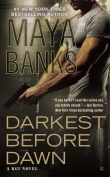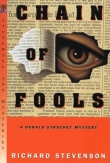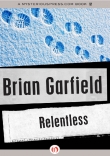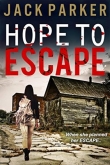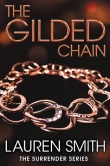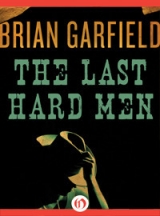
Текст книги "The Last Hard Men"
Автор книги: Brian Garfield
сообщить о нарушении
Текущая страница: 5 (всего у книги 12 страниц)

Four

Carrying the tearstained note, Sam Burgade went, as if against his will, into his daughter’s room. It was sunny in there, the muslin curtains stirring in a warm breeze, womanly things scattered around in disarray, drawers flung open, the wardrobe standing ajar.
Burgade’s face kept changing. Muscles stood ridged at his jaw hinges and the bones at brow and cheek became harder, more prominent.
He pushed his solemn glance at things in the room as if to engrave them indelibly on his memory. Then he strode out of the house and marched, not running, around half the block to Packers little grocery. Packer had a telephone. Burgade got through to the sheriffs office.
Noel Nye’s voice came at him, scratchy and distant “Oh, there you are. Listen, that big noise from up on the hills, it was them. They blowed up the smelter safe. Left one of their own dead behind—one of my boys recognized him, Lee Roy Tucker. It was them convicts, all rat. They tooken off with a coupla hundred dollars petty caish.”
“That’s not all they’ve taken,” Burgade said. “Susan’s gone.”
Nye came into the house wiping his face on his shirtsleeve. His face in all its clubbed ugliness was full of forlorn dignity. “Captain, I cain’t tell you how sorry I am.”
“Yeah.” Burgade’s scalp contracted.
“Well, we doin’ everthang we can to get her back, Captain. Everbody owns a horse and a gun’s out there beatin’ the brush for sign.”
“Out where?”
The sheriff spread his hands. “Mostly up in the mountains back of the smelter.”
“They didn’t go that way. They had to come by here to collect my daughter. They didn’t have her with them when they robbed the smelter, did they? Well, then—they must have come this way. From here they could only head up the valley toward Phoenix or up into the Catalinas.”
“Sure, Captain, you’re rat. Too much goin’ on rat now, I reckon—I ain’t been thanking straight. Hell, I better not set around here and jaw all day.” He clapped on his campaign hat and swung to the door.
“I’m coming with you.”
“But—”
“She’s my daughter, Noel.”
“Sure enough. Hell, come on, then.”
At noon a council of war was held in the sheriffs office. Reports came in by telephone from the edges of the city. Nothing came in from beyond the town limits; the cross-country wires were down somewhere, doubtless cut by Provo’s men. It might take the linemen a day to find the breaks and repair them.
“In the meantime,” Sheriff Nye said judiciously, “let’s sort out what we do know. They’s probably eight of them. Five men was seen at the smelter office but one’s dead, Tucker. That’s four, and one to hold the horses makes five. Sixth man down the road between the smelter and town to cut the telephone. Seventh and eighth at both ends of Tucson to cut the wares. All rat. We got to figure they all of ’em armed to the teeth. They cut crosst along the Rillito, I reckon, so they must of rendezvoused somewheres up in the foothills of the Catalinas. That’s where most of our people are lookin’ now. Captain, how do you tote it?”
Burgade was sitting toward the back of the room, dry-washing his hands. Heads swiveled toward him—the mayor, the chief of police, the undersheriff, the editor of the Star, three or four councilmen, the county supervisor, and the prosecuting attorney. They all watched him with grave concern.
“They’re on horseback,” Burgade said slowly, weighing his words. “You can’t hope to block off the roads and railroads and catch them that way. They’ve got to be tracked, the old way, by men on horseback. That’s how I tote it.”
The mayor said, “But is that wise, Sam? If they catch sign of pursuit won’t it put Susan in danger?”
“She’s in danger with them at all times,” Burgade said in a flat voice. “They expect to be tracked. Provo’s not a stupid man. He took my daughter because he wanted revenge against me—a personal thing. But he also took her because he wanted a hostage, and that means that wherever he’s planning to go, he realizes he won’t be able to hide his back trail. If he planned to head directly into Mexico and hide out in the Sierras he’d have killed Susan by now—she’d only slow him down. No, he–”
“Wait, Sam,” the prosecuting attorney said “I don’t know how to put this so it won’t twist the knife. But how do we know they haven’t already killed Susan?”
“They made her pack several changes of clothes.”
“Is that conclusive enough?”
“It is to me. Provo wants to keep her alive. He knows if we find her dead, nothing on earth will stop me from finding him and putting him to the most painful death it’s possible for a man to have. No. She’s alive. As long as she’s alive with him, I bleed and he knows I’m bleeding and he also knows I’ve got to keep my distance.”
“The goddamned bastard’s clever,” the mayor said. “As clever a fiend as–”
“Let’s not waste time calling him names.” Burgade’s eyes were flinty, glittering, unfathomable: he kept his feelings strictly to himself. His voice was level, under total control. “There’s no reason why any of you should abide by my judgment any longer. I’m the one who created this disaster. I’m responsible for what’s happened this morning—Susan wouldn’t be gone and the smelter office wouldn’t have been blown up if my scheme hadn’t drawn Provo here. Replacing that vault will cost thousands—you might advise the manager that I’m prepared to make restitution to whatever limits my savings can cover. Now, as to the–”
“Nonsense,” the mayor exploded. “You can’t possibly be held to blame for the mindless animal savaging of these beasts. If anything, the smelter’s in your debt—you advised them to postpone their payday, otherwise the vault would have been full of cash.”
“That’s neither here nor there,” Burgade said. “We’re getting off the point. I don’t have the power to insist that anybody heed my advice after what happened this morning, but what I’m going to do is provision myself with a horse and some weapons and get on Provo’s track. I intend to stick to the track until I can get my daughter out of their hands and then I intend to kill Provo and his crew the way you’d kill a pack of rabid wolves, I’m speaking for myself. I’d be obliged for company but I’ve got no authority to ask for it.”
He put his hands on his knees and stood up slowly, feeling old in his joints, feeling as if a fist had slammed him low in the belly and crumpled him. Dry-eyed, he walked to the door.
He hired the best horse Ochoa had in the stable and a good solid double-rig saddle with plenty of concho strings and a leather rifle boot and a long skirt behind the cantle across which provisions could be strapped. He had to hold in the nervous prancing gelding on his way down the crowded streets; the horse danced along half-sideways. He tethered it to the gatepost in front of his house and went inside to make up a field pack for himself.
He chose each item with studied care. A lightweight rawhide rope, sixty feet long, coiled in a tight ring. A two-quart water canteen. Blanket-roll and rain slicker. Folding pocket knife and a nine-inch fighting knife in a leather scabbard slotted for threading over a gunbelt. Antiseptic and bandage cloth. A folding razor, not for whisker-shaving but for use as a weapon, a slicing blade, and a snakebite remedy. Gloves and a fleece-lined mackinaw for the high country, if the trail should take him that way. Flint-and-wheel firelighter and a waterproof oilskin pouch of sulfur matchsticks. His old Army-style mess kit, with its accordion-collapsible cooking pot and coffee cup, its mated locked cookpans and utensils. Soap, a spare shirt, underdrawers, socks, a thick soft pair of Hopi moccasins, a coil of strong fine fishing line, twine ball, towel, field glasses, steel picket stake, rope hobbles. He packed it all together with tight efficiency, most of it inside the, blanket-roll and the rest in saddlebags which he left as empty as possible to accommodate food and ammunition.
He went into the front room and unlocked the gun chain. Took down the Springfield bolt-action .30-06. He weighted the saddlebags down with ammunition and went outside carrying canteen, blanket-roll, saddlebags, and rifle. Stowed them all aboard the horse and climbed up into the saddle and rode at a trot around to Packer’s grocery. He went inside and bought enough provisions, as concentrated as he could find, to fill a small gunnysack, which he tied on top of the blanket-roll with piggin’ strings.
That was it, then. He couldn’t think of anything he’d forgotten. He put his foot in the stirrup and gathered the reins and hoisted himself up. It was a stiff climb for an old man: he had to lift his right leg high over the pile of provisions. He got settled with half his weight on the balls of his feet in the wood stirrups, adjusted the reins in the fingers of his left hand, tugged his hatbrim down tight, and clucked to the horse.
Sheriff Nye came up the street with a mounted posse—young Hal Brickman, very graven-faced, and eight or nine deputies.
“Here you are,” Nye said. “Thought we missed you back at the house.”
“Why,” Sam Brigade said, “I’m obliged, Noel.”
“My job, ain’t it, Captain?”
They found the camp in Rose Canyon at about four in the afternoon. There was no mistake about it because a bit of cloth clung to an obvious branch. It was torn off Susan’s sunbonnet, the one she wore around the house on washday.
“Message from Zach Provo,” Burgade drawled. The surfaces of his eyes glittered like hard gems.
Nye said, “They cain’t have more than four, five hours’ jump on us’” He turned back to his horse. “Come on, the trail don’t get no shorter while we set here staring at it”
Burgade saw Hal Brickman’s eyebrows contract. The young man was staring around the creek-bank camp ground with a grief-stricken look that was no sham; he had kept it to himself on the ride up from Tucson but he was beginning to look as if he was ready to let loose. He cut a faintly ludicrous figure in his narrow snap-brim hat and dude jodhpurs, a revolver buckled awkardly around his waist, high up in one of those Army-style holsters with a protective snap-down flap. If he’d carried his gun inside his saddlebag it might have been a little harder to reach, but not much. Still, his earnest anger was genuine and he had not whimpered. In other circumstances, Burgade might have had a great deal of room for sympathy toward him: Hal’s anguished face was evidence enough of the sincerity of his love for Susan and the agony of not knowing what he could do to save her.
Nye was down on one knee. “Look here, Captain.”
Burgade went over to him and leaned over to focus his attention on the ground at the point of the sheriffs finger.
“One of them horses got a tie-bar shoe here, lakly to hold in a soft hoof.”
“That’ll leave a distinctive print,” Burgade said. He walked forward leading his horse, seeing where the tie-bar track went. There was a big muddle of prints where several horses had trampled one another’s tracks but toward the upper end of the clearing it got sorted out and Burgade turned back to gather his reins and climb into the saddle. “They went on up the canyon.”
“Ain’t trying hard to hide their tracks, that’s for sure,” Nye said.
Hal Brickman brought his horse up to the head of the column. “Look, I’m not sure about all this.”
Sun and wind wrinkles gathered at the corners of Burgade’s eyes. “Nobody is, Hal.”
“No, I mean won’t they be likely to harm Susan if we crowd them?”
“They’ll be more likely to harm her if we don’t.”
“I’m sorry, sir, but that doesn’t make much sense to me.”
Noel Nye said, “Gentle down, son. This is just as • hard on the Captain as it is on you. You got to trust us to know what we doing.”
Hal’s tortured eyes swept from face to face. “Look, you know all about manhunting and fighting and I’m just an engineer, I’m a greenhorn here, and I admit it. But I don’t care about bringing these men to justice or getting revenge or anything else. I just want to try and help make sure Susan isn’t hurt.”
“That’s what we all want,” Nye said. “Son, you bound to take our word for it, we know what we doing—the Captain knows what he’s doing.”
Burgade’s bleak glance simmered on the trees up-canyon. Hal spoke rapidly, his voice climbing, starting to lose control: “If we push them they may get rattled—God knows what they may do. Suppose they panic? Suppose they split up and run for it? They won’t leave Susan behind, alive.”
Burgade said, very mild, “Then what do you suggest?”
“My God, I don’t know, but shouldn’t we take it easy?”
“And let them get clean way, you mean,” Nye said. “What good’s that going to do her?”
Burgade said, “We’re wasting time,” and put his horse up into the trees.
At the head of the canyon the tracks took them along the sloping side of a scrubby hogback and up toward the dip in the center of a high-ground saddle. Burgade unsheathed his field glasses and played them over the higher stretches ahead. Magnification made the sun-struck pinpoints of mica reflections strike his eyes like needles. A dry layer of heat lay along the mountains; the slopes lifted steeply toward tall-timber country and timberline beyond, the bald ten-thousand-foot summits of the Catalinas. Along here it was mostly loose sun-whacked earth and boulders, bucking up toward the Windy Point district.
He didn’t see any sign of movement but that was no surprise; the great shoulders of these mountains could hide—and had hidden—armies. The Chiricahua Apaches had fought a campaign up here, using the torturous canyon mazes as a stronghold against Hitchcock’s struggling troopers, Three decades ago Burgade had tracked renegade Indians and outlaw fugitives through this patch of the Rockies, and nothing had changed; the crags and gorges were as immutable as time. It was a stiff ankle-busting climb to the passes, but once down the far side it was a fast level run up the flat bed of the San Pedro Valley toward the high pine country of central east Arizona and the lava badlands beyond, or the Apache and Navajo country to the north. Or, if Provo had turned south along the San Pedro, he would have an easy trail along the Southern ‘Pacific Railroad spur to Bowie, from which he could disappear in any direction—east toward Lordsburg and El Paso, south through Cochise’s old battlefields into Mexico, west into the chopped-up Huachuca country around Tombstone. Down in that lower right-hand corner of Arizona you could hide out for fifty years without being found, if you didn’t mind the heat and the rocks and the total lack of greenery. Cochise and Geronimo had proved that. But Burgade had a feeling Provo wasn’t going to turn that way.
The posse climbed steadily into the waning afternoon. There was no talk. Nobody knew what they were going to do if they did somehow catch up with the fugitives; nobody wanted to talk about that, except Hal Brickman, and Hal kept his own counsel after Burgade’s rebuff.
Burgade had ideas how to handle it, but there was no point in spelling them out until the time came. In the meantime his old backside was starting to get saddlesore already and he concentrated his attention on the faint scuffmarks and dents of the fugitives’ track.
Just on sunset they climbed out of a canyon thick with clawing manzanita and saw the juniper-piñon slopes rising ahead, northeast, while a swift grade fell away to the right toward the lower pass and Spud Rock in the Rincon peaks, The tie-bar print and its companion hooftracks arrowed straight up into the piñon forest. Nye crowded his horse up alongside Burgade and said, “Could be they trying to throw us off, here. If I was them I’d head down that slope over the easy pass instead of goin’ over the top the hard way. What you bet they done cut off up ahead and doubled back down over Redington way?”
“No,” Burgade said, “they’re headed over the top.”
“Well, Captain, I ain’t so sure about that. And the lights gettin’ poor for tracking. No use trailin’ blind—we better camp here and track at sunup.”
“Camp if you want to. I’m going on. Provo won’t stop tonight—I don’t want to give him an extra eight hours on us.”
“Maybe you’re rat. But if they turn off someplace during the night, we gonna lose more’n eight hours, time we backtrack and pick up the trail again. You fixin’ to take that chance?”
“I am.”
“You always was a gambler.”
“I think I know where he’s headed, Noel, and I mean to catch him before he gets there.”
“Where’s that?”
“Window Rock Reservation.”
Nye’s eyes widened. “All the way up there? Hell, our people in Tucson ought to have the telephone and telegraph wares fixed up by now, Captain. Posses gonna be deploying out of every town between here and Window Rock—and that’s two hundred mile. Provo’d be a fool to run that gantlet.”
“He’d be a bigger fool not to. He’s got a hostage, remember? No posse’s going to brace him. He’ll stay out of their way if he can, but if they jump him they’ll have to give him room to get by. He’s counting on that, otherwise he’d have been covering his tracks by now.”
“All rat, then, since you brang it up. Suppose we do get close to him. What then?”
“Let’s catch him, first,” Burgade said, and put his horse up into the piñons.

Five

When the leader called a halt, Susan dismounted, moving awkwardly, uncomfortably conscious of her body and the way some of them stared at her. She was still in a detached state, like a waking dream—everything. she saw registered on her mind, she was aware of every detail, but she felt stunned. Very little anger had seeped through the haze, and not much fear.
While Zach Provo walked a few paces out onto a promontory slab and extended his collapsible spy-glass, the rest of them stood around dividing up a small sheaf of money. From the talk, she gathered they had stolen it from the smelter. She watched the young one wad up his folded greenbacks and insert them in a chamber of his six-gun. “Rainy-day money,” he said dryly, looking at the cloudless twilit sky. The sun had just gone down with a blaze and a wink.
The young one had a friendly face. His name was Mike Shelby; he had told her cheerfully on the trail. Why don’t we just abandon convention and introduce ourselves? He seemed incredibly easygoing, as if nothing really touched him. She envied him she knew that soon she was going to wake up to the unspeakable terror of it.
As though it were a social Sunday picnic the young Shelby had named all of them for her. Somehow the names had lodged; it was a habit she had developed on purpose as a schoolteacher. Each term on the first day of class she asked each new student his name, and had a way of fixing her stare on the pupil’s face so as to memorize it and associate the name with it. Dear Lord, that classroom was in another world.
The sky was red to the west. The little one, Cesar Menendez, had walked out onto the point of rock with Provo and she heard Provo’s toneless voice. “Coming right along.” Provo lowered the telescope and pushed it shut.
Menendez said, “Burgade with them?”
“Too far away to tell. But he’s got to be. Wild horses couldn’t hold the bastard back.” Provo turned on his heel and came back toward them. His cold stare flicked across Susan; for a moment she closed her eyes, trying to shut it all out, but a twanging voice which she identified as Portugee Shiraz’s said, “I got to take a leak.” She opened her eyes and saw Portugee, unbuttoning his fly, walk off into the rocks, the bad teeth showing in his vulpine face. His skin was dark as George Weed’s but his features were not as heavily Negroid. They were a strange mixture of races, these convicts—only two of them. Will Gant and young Mike Shelby, were (or at least appeared to be) white men; Provo had a leathery Indian face, Portugee Shiraz was at least part black, George Weed was the color of a charred steak, Taco Riva appeared to be Mexican-Indian, Menendez of the same stock, and the silent Joaquim Quesada, big-faced and half bald, probably had as much mestizo blood as Spanish conquistador in him.
In some way, keeping them all sorted out this way seemed a necessary exercise in the preservation of sanity. Identifying them by color and cheekbone-shape was an arbitrary way to classify them but it kept her brain busy; as she heard them speak more, she would start sorting them out by personality and talents.… What was this madness? They weren’t fourth-grade pupils! You have got to get a grip on yourself.
When Portugee came back she saw Zach Provo pick up the reins of his horse. “Mount up.”
“Aw, Jesus, Zach,” said Portugee, “I’m tard.”
“Posse down there,” Menendez told him in a casual way. “You want to es-sleep till they get here and arres’ you, Portugee?”
“Hell, they got to keep their distance long as we got her.”
“Don’t count on it,” said Will Gant, and came around from the far side of his horse to face Portugee and Zach Provo.
Portugee said, “Then what’d we brang her for?”
“Because Zach wants to sweat old Sam Burgade.”
Portugee scowled and bit a hangnail on his thumb. She saw Mike Shelby turn to watch the byplay. Will Gant said, “Time we got one or two thangs straight, Zach.”
“No time for that now.”
Mike Shelby said, “Maybe let him get it off his chest. He’s lookin’ as unhappy as a soaked cat.” He smiled in a friendly way. Quesada looked on, mute; Taco Riva was holding his horse by the bit chains, murmuring to it, indifferent to the others.
Will Gant shifted his stance. He seemed to realize he had thrown raw meat on the ground. He cleared his throat and said irresolutely, “Look, all I mean is, we come all the way down here on Zach’s say-so to git us a heap of money, and what’d we end up with? A few dollars pocket change. All’s we want now is get shet of that posse. Maybe as long as we hang onto this girl we keep them at arm’s length, but ain’t nothing stopping them from tracking us, don’t matter where we go. We can’t hide out with them ten mile behint us. We keep going like this and sooner or later they going to rail us, girl or no girl. We can’t all stand in a line behint her when the bullets start flying. What I say, we ought to split up soon as we get acrosst these mountains. Everbody go their own way. Posse can’t chase all of us if we all go different ways.”
Provo said, “You’re talking out of turn, Will.”
“No. You ain’t my warden, Zach. Look, you want to get Sam Burgade hogtied and sweatin’, that’s your lookout. But we ain’t forgetting Sam Burgade would like to see you right where you’d like to see him. You was born to get hung, Zach, and I don’t rightly see no reason why the rest of us got to get hung alongside of you. You go ahead and play out your string with Burgade, that’s your binness, ain’t nobody trying to stop you. But I don’t cotton to it myself. I’m fixin’ to go my own way once we over the top.”
“You’re wasting wind,” Provo said. “Are you fool enough to think that’s the only posse in Arizona? By now they’ve got those cross-country wires spliced together and they’ve sent word on us out to every hick town in the state. I’m the only thing in the world that’s keeping you out of their hands, Will—me and missy, here. You go busting off on your own and they’ll hunt you down in no time flat.”
“I guess I’ll just take that chance.”
Susan glanced toward Menendez. His sharp little face was watchful and immobile. She looked away, chilled, and plucked at the frayed seams of her ripped sunbonnet. Provo had ripped a big piece of it off to hang on a twig down in Rose Canyon where her father couldn’t miss seeing it. Poisoned, she thought—His mind’s poisoned She was beginning to wake up, she realized; her body was going rigid, starting to tremble.
Portugee said in his high-pitched twang, “He’s rat, Zach. No hard feelings, now, but you got us this far on yo’ promise that we was gonna get a lot of money out of that smelter. Maybe it wasn’t yo’ fault, maybe lak you said it was Burgade put them up to it, but all the same we just as broke as we was before. I reckon I got as good a chance my own self as I got stickin’ with you-all.”
“No,” Provo said. “We stay together. All of us.”
Will Gant moved wider away from Portugee, snapped a glance at Menendez, and said, “What the hell for, Zach? Why you so damn set on keepin’ us together?”
“It’s for your own good, Will.” But even to Susan it sounded lame; she looked at Provo in bewilderment. She saw his eyes flicker, shifting from face to face, and knew what he was doing—he was measuring each one of them, sizing them up. Probably trying to decide how many were on his side. She hadn’t sorted out all their loyalties and knew nothing of their motives, but it was clear that for whatever reason, Menendez was Provo’s ally. As for the rest, it was impossible for her to tell. She had a feeling Shelby was willing to go along with Provo, but not to the extent of fighting the others over it. Taco Riva didn’t seem to care about much of anything except the horses. Quesada was unfathomable. George Weed had not spoken ten words in her hearing and she had no idea of his sentiments—until now, when Weed stirred and spoke:
“Maybe you better spell out whatever it is you got in mind, Zach. Then we can decide.”
Provo seemed indignant. “I’ve pulled all of you through this far, haven’t I? You know what happened to the rest of the cons that busted out with us, don’t you? Every one of them ended up back in Yuma. All except you men—because I took you under my wing. You’re still loose because I’m the only one with brains enough to keep you loose. And you want to walk out on me. All right, walk. See how far you get.” He wheeled to his horse in anger and gathered the reins to mount.
It was Quesada, strangely, who spoke: “That’s not enough anymore, Zach.”
It turned Provo around. “What?”
The big bald-headed man had a slow, apologetic way of talking. He looked like a drunk, with his purplish face and big red nose and shifty eyes. “You had a plan, before. We was gonna get enough money to get out of the country. Like Portugee said, maybe it wasn’t your fault the money wasn’t there. But at least we had it to shoot for. What we got to shoot for now? What are you offering us?”
Provo snorted. “Your skins.”
“Maybe we can look out after our own skins, Zach.”
“Maybe you just think you can.” But he was looking them over again and Susan could see it when he realized he had lost them. Weed, Portugee, Gant, Quesada, they had all turned cold toward him. Shelby was frowning at his boots, not sure which way to turn. Menendez was the only one who didn’t look worried and adamant. Even Taco Riva was watching with evident interest.
Provo let the reins drop from his fist and turned away from his horse to face the rest of them. He looked slightly disgusted. For a moment his hard stare rested against Susan and she felt the icy touch of dread.
Provo said, “It’s like this. I owe Sam Burgade. I owe him a little something for the twenty-eight years I put in on the rockpile and for one or two other things we don’t need to go into. I want you gents to help me pay off that debt. No, let me finish. You want to know what’s in it for you. I’ll tell you. First, where I’m taking you, that posse won’t be able to follow us. It’s out of bounds for them. Burgade, maybe, but Burgade’s just one man. The posse won’t come with him. Figure out those odds and then stack them up against the odds you’d face if you cut out on me and tried to run for it on your own with every sheriff in Arizona looking to nail you. Second, you still want money. All right. I’ve got forty-eight thousand dollars in gold coin buried up on the Mogollon Rim. I need to use some of it to pay off certain people to make sure the law ain’t allowed to follow us where we’re going. I intend to keep some of it for myself. But I’ll put up twenty-one thousand dollars. It’s yours to split—three thousand apiece. Three thousand dollars is a lot of money to a man on the run. Now let’s get on these horses and move out. You think about my offer on the way over the top.”
He turned quickly, breaking up the tableau. “Come on, missy, put it in the saddle, all right? Or do I have to pick you up and tie you on?”
Riva rode point, because he seemed able to communicate things to a horse that nobody else could. Riva picked the path in the starlit dark, and the rest followed at a steady slow-climbing pace. Susan sat her saddle loosely, weary, resting both hands on the saddle horn because she didn’t have any reins to hold—Quesada had the reins, he was leading her horse. They weren’t taking any chances with her. Provo had tied one of her ankles to the stirrup leathers to insure she wouldn’t try to jump off her horse and run for it in the darkness. She had bent down once to try and shift the knot, because it was digging her ankle bone painfully, but the man right behind her—Menendez—had spoken sharply and gigged his horse close and threatened to slash her with his quirt, and she had straightened up and ridden in silence after that.
She felt grit-dirty inside the homespun dress. It seemed clear that Provo intended to push straight through the night, only stopping now and then to breathe the horses. At this rate she wondered how long he expected the animals to last, let alone their riders.
Through the first few hours of the night ride she swung from mood to mood like a lunatic, weaving from one extreme of emotion to another: terrorized dread that made her tremble violently and repress screams of fear; furious rages that made her want to claw the eyes out of all their faces—she had wild violent visions of tying them all to stakes and building huge fires around them—and left her weak, drained; dirges of self-pitying resignation, waiting for them to kill her and be done with it; frightful fantasies in which she saw them holding her down, spreadeagling her, venting their sweaty lusts upon her body; spates of cynical uncaring exhaustion in which she went numb, told herself to just mark time until it was over—hope to survive it, and ignore whatever might happen in the meantime.
Finally they reached the summit of the pass and started down the long eastward slope toward the San Pedro River. It must have been well past midnight, although she was not versed in reading the time by stars. Her body was slack, moving loosely with the jolts and shifts of the saddle. The hot rages and icy terrors had cooled and thawed within her; fantasies had dulled, resolve had dissipated. It was no longer necessary to force indifference upon herself. She was too washed-out to care anymore. She swayed as if she were asleep; she was not asleep, but neither was she altogether awake. A kind of peace had settled on her, a protective daze from which she did not expect or want, to emerge.

